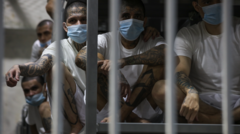El Salvador’s President Nayib Bukele has made a bold proposal for a humanitarian prisoner exchange with Venezuela, offering to repatriate 252 Venezuelan nationals deported by the United States in return for the release of an equal number of political prisoners currently imprisoned in Venezuela. This proposal was laid out in a direct appeal to Venezuelan President Nicolás Maduro via social media, where Bukele highlighted the differing nature of the detainees’ offenses.
According to Bukele, many of the Venezuelan deportees have been accused of serious crimes such as "rape and murder," while he claims that the Venezuelan political prisoners are incarcerated solely for opposing Maduro's government, which is facing widespread criticism over its re-election legitimacy. Human rights organizations have challenged the Venezuelan government's assertion that it holds no political prisoners.
In his tweet, Bukele stated, “I want to propose you [Maduro] a humanitarian agreement calling for the repatriation of 100% of the 252 Venezuelans who were deported, in exchange for the release... of the identical number from among the thousands of political prisoners that you hold.” He further noted the inclusion of nearly 50 prisoners of other nationalities, some of whom are U.S. citizens, in the proposed deal.
The Venezuelan administration has yet to respond publicly to Bukele’s offer. Recent movements indicate that over 200 Venezuelans have been sent from the U.S. to El Salvador. The Trump administration has accused these individuals of being members of the Tren de Aragua gang, a notorious criminal organization, and has worked on legal frameworks to expedite their deportations.
As political tensions rise, this proposal marks a significant moment, showcasing the intricate ties between immigration policies, international relations, and human rights. The U.S. Supreme Court's recent order to pause deportations of certain Venezuelan gang members adds another layer of complexity to the unfolding situation, highlighting ongoing challenges within the realm of immigration law and practices.




















